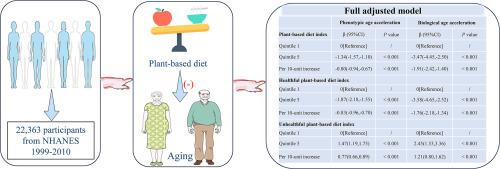健康的植物性饮食与生物老化率呈负相关:一项基于美国成年人的全国性研究。
IF 3.1
3区 医学
Q2 NUTRITION & DIETETICS
引用次数: 0
摘要
植物性饮食对健康的益处是公认的。然而,有关美国人口中植物性饮食质量与衰老之间关系的证据却很有限。本研究旨在调查不同植物性饮食指数、表型年龄加速度(PhenoAgeAccel)和生物年龄加速度(BioAgeAccel)之间的关系。我们假设,健康的植物性饮食会对美国成年人的表型年龄加速(PhenoAgeAccel)和生物年龄加速(BioAgeAccel)产生负面影响。横断面分析包括 22,363 名参与者,信息来自美国国家健康与营养调查数据库。植物性膳食的质量通过三个指数进行评估:植物性膳食总指数(PDI)、健康植物性膳食指数(hPDI)和不健康植物性膳食指数(uPDI)。表型年龄(PA)和生物年龄(BA)是根据先前确定的方法,根据年代年龄和 12 个多系统临床化学生物标志物的线性组合计算得出的。PhenoAgeAccel 和 BioAgeAccel 是 PA 和 BA 的残差。加权线性回归分析用于评估 PDI、hPDI 和 uPDI 与 PhenoAgeAccel 和 BioAgeAccel 之间的关系。在对所有协变量进行调整后,我们发现 PDI 分数每增加 10 个单位,PhenoAgeAccel 就会降低 0.80 年(β:-0.80,95% 置信区间 [CI]:-0.94,-0.67),BioAgeAccel 就会降低 1.91 年(β:-1.91,95% 置信区间 [CI]:-2.42,-1.40)。hPDI 分数高 10 个单位与 PhenoAgeAccel 降低 0.83 年(β:-0.83,95% CI:-0.96,-0.70)和 BioAgeAccel 降低 1.76 年(β:-1.76,95% CI:-2.18,-1.34)有关。相反,uPDI 分数高 10 个单位与 PhenoAgeAccel 高 0.77 年(β:0.77,95% CI:0.66,0.89)和 BioAgeAccel 高 1.21 年(β:1.21,95% CI:0.80,1.62)有关。这些研究结果表明,美国成年人可以通过更多地坚持健康的植物性饮食来延缓衰老。本文章由计算机程序翻译,如有差异,请以英文原文为准。

Healthful plant-based diets are negatively associated with the rate of biological aging: A national study based on US adults
Plant-based diets are recognized for their health benefits. However, evidence on the association between plant-based diet quality and aging in the US population is limited. This study aimed to investigate the association between different plant-based diet indices, phenotypic age acceleration (PhenoAgeAccel), and biological age acceleration (BioAgeAccel). We hypothesized that healthful plant-based diets would negatively affect PhenoAgeAccel and BioAgeAccel in US adults. The cross-sectional analysis included 22,363 participants, and information was obtained from the National Health and Nutrition Examination Survey database. The quality of plant-based diet was assessed using 3 indices: overall plant-based diet index (PDI), healthful PDI (hPDI), and unhealthful PDI (uPDI). Phenotypic age (PA) and biological age (BA) was calculated based on a linear combination of chronological age and 12 multi-system clinical chemistry biomarkers in accordance with the previously established method. PhenoAgeAccel and BioAgeAccel are the residuals of the PA and BA. Weighted linear regression analyses were performed to evaluate the relationships between PDI, hPDI and uPDI, and PhenoAgeAccel and BioAgeAccel. After adjusting for all covariates, we observed that a 10-unit higher PDI score was associated with 0.80 years lower PhenoAgeAccel (β: -0.80, 95% confidence interval [CI]: -0.94, -0.67), and 1.91 years lower BioAgeAccel (β: -1.91, 95% CI: -2.42,-1.40). A 10-unit higher hPDI score was associated with 0.83 years lower PhenoAgeAccel (β: -0.83, 95% CI: -0.96, -0.70), and 1.76 years lower BioAgeAccel (β: -1.76, 95% CI: -2.18, -1.34). Conversely, a 10-unit higher uPDI score was associated with 0.77 years higher PhenoAgeAccel (β: 0.77, 95% CI: 0.66, 0.89) and 1.21 years higher BioAgeAccel (β: 1.21, 95% CI: 0.80, 1.62). These findings suggest that US adults may be able to slow the aging process by increasing adherence to a healthy plant-based diet.
求助全文
通过发布文献求助,成功后即可免费获取论文全文。
去求助
来源期刊

Nutrition Research
医学-营养学
CiteScore
7.60
自引率
2.20%
发文量
107
审稿时长
58 days
期刊介绍:
Nutrition Research publishes original research articles, communications, and reviews on basic and applied nutrition. The mission of Nutrition Research is to serve as the journal for global communication of nutrition and life sciences research on diet and health. The field of nutrition sciences includes, but is not limited to, the study of nutrients during growth, reproduction, aging, health, and disease.
Articles covering basic and applied research on all aspects of nutrition sciences are encouraged, including: nutritional biochemistry and metabolism; metabolomics, nutrient gene interactions; nutrient requirements for health; nutrition and disease; digestion and absorption; nutritional anthropology; epidemiology; the influence of socioeconomic and cultural factors on nutrition of the individual and the community; the impact of nutrient intake on disease response and behavior; the consequences of nutritional deficiency on growth and development, endocrine and nervous systems, and immunity; nutrition and gut microbiota; food intolerance and allergy; nutrient drug interactions; nutrition and aging; nutrition and cancer; obesity; diabetes; and intervention programs.
 求助内容:
求助内容: 应助结果提醒方式:
应助结果提醒方式:


